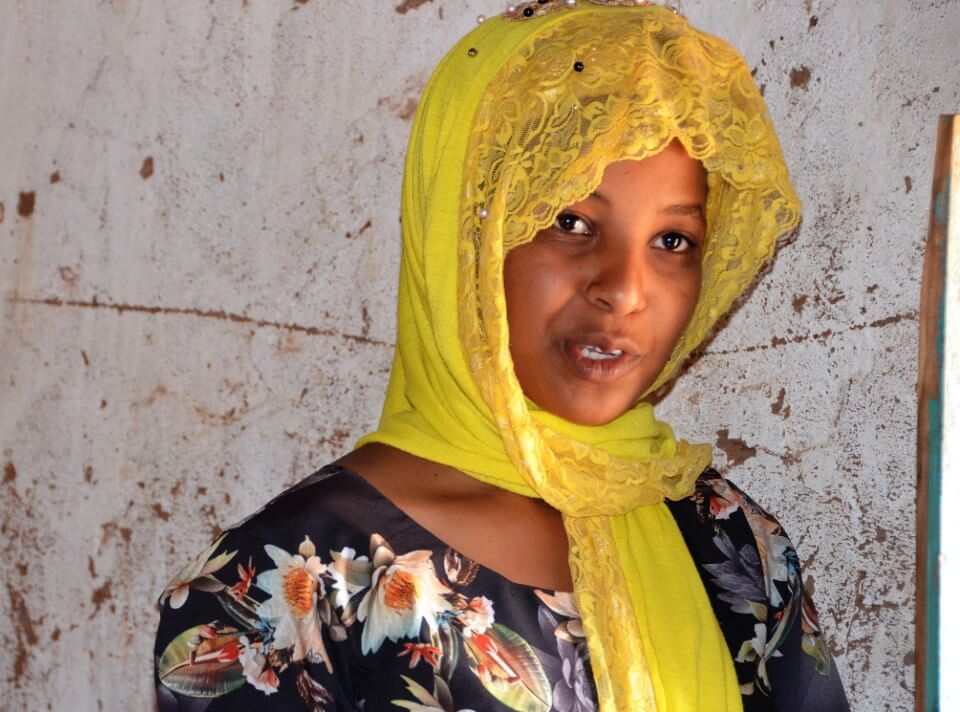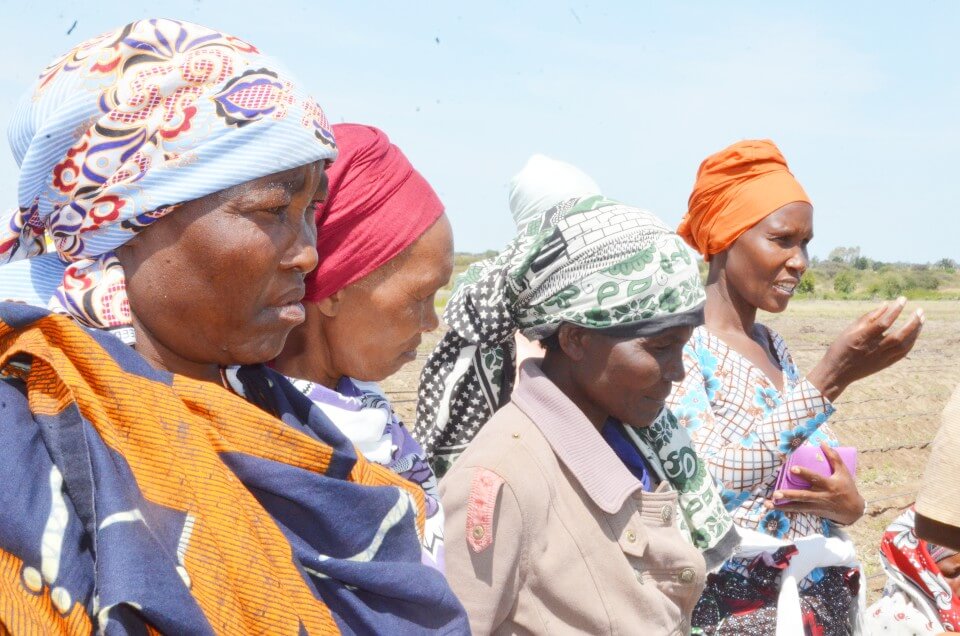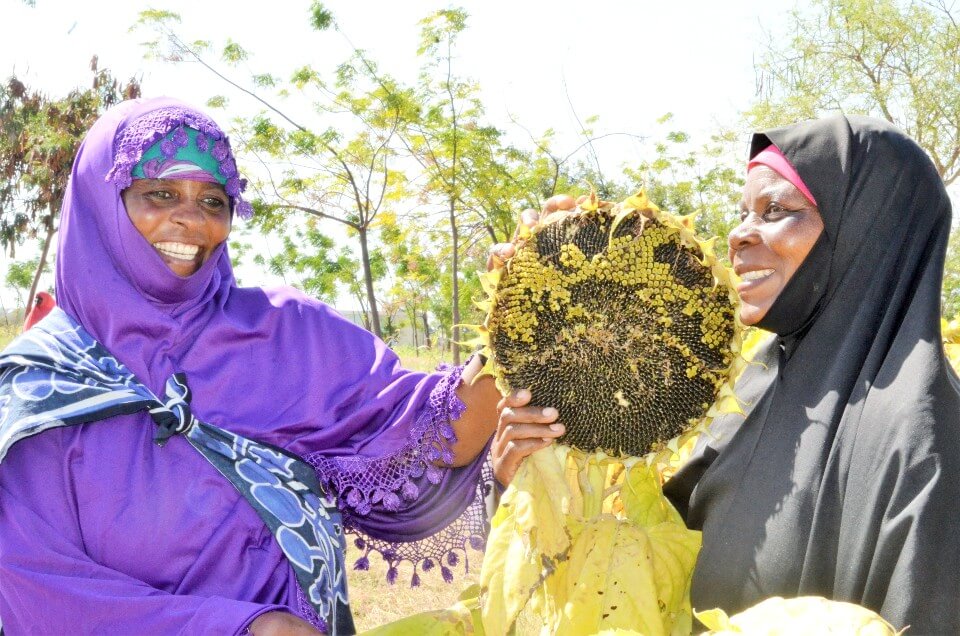UN Women, UNFPA joint programme supporting women and girls in Tanzania to keep their dreams alive
Date:
Lightness Joseph is one of many teenage girls nurturing big dreams to see a great economic transformation in their community in the Kipumbuiko village, Singida region. In most Sub Saharan Africa, rural economies are often left behind, despite their potential to create opportunities for the local people. Lightness believes that “an Ikungi district that can flourish beyond its expansive sunflower farmlands is possible.”
During a recent field visit to the Singida projects jointly implemented by UN Women and UNFPA through the Realizing Gender Equality through Empowering Women and Adolescent Girls Programme, funded by the Korea International Cooperation Agency (KOICA), Lightness Joseph shared her vision of how an inclusive economic transformation should look like.
At just 19 years of age, she envisions a generation of socially and economically empowered women driving sunflower oil processing companies, horticulture storage and packaging enterprises, and cashew and honey centres. Her ideas on the direction her district must take show a profound understanding of the economic potential and resources that can drive Ikungi’s development, if properly managed and effectively utilized. Yet there are also hurdles stunting the much needed progress.

In an interview with the then Ikungi District Executive Director at the time of the field visit, Mr. Martin Kijazi said removing all obstacles to women’s participation in all development sectors demand progressive partnerships that can help to change a mindset blocking women and girls from achieving their full potential.
“We would like to see better days in Ikungi, and for this to happen, both women and men must work side by side to grow our economy. The development we seek should be driven by women and men of Ikungi as we intensify our investment in the education of girls and agriculture to modernize our economy, working with various partners in Tanzania and beyond,” said Mr. Kijazi.
Similar to most rural districts in Tanzania, women in Ikungi make up the majority of subsistence farmers who toil under harsh weather conditions to provide for their families. It is activities such as agriculture, livestock production and small businesses, which form the backbone of the district’s economy. However, there are also opportunities in the tourism and hospitality sector, for example; Singida’s vast alkaline lakes, including Singidani, Kindai and Kitangiri, are recreational hotspots that boast of potential for water sports. No wonder the majestic Pelicans and Flamingos like it here.

Apart from the potential in tourism, the Ikungi district council also understands the importance of ensuring inclusive and progressive land management to create and sustain livelihoods. Working in partnership with UN Women, the district council is promoting land ownership by women. With empowered girls such as Lightness Joseph, ownership and control over land can no longer be a business affair reserved only for men in Ikungi. Moreover, women are key players in the agriculture sector, and therefore leaving them behind in the management and control of land would be counter-productive.
Ms. Hodan Addou, the UN Women Representative in Tanzania says the Joint Programme is supporting the Ikungi district council to enhance the land tenure security system, and importantly, promoting women’s sole and joint land ownership, control and decision-making on all land related issues.
So far, four villages have acquired Land-Use Plans, and in the next two years, Ms. Addou says, the programme will continue to support participatory village land use planning, and issuance of Certificates of Customary Rights of Occupancy (CCROs). “More than 6,000 people, and mostly women, will benefit from this component of the intervention package,” says Ms. Addou.
The UN Women-UNFPA partnership is also working to ensure that the various elements of the Joint Programme support and build on each other. For example, the 25 adolescent girls who are members of the Moto Moto Girls Club led by Lightness Joseph – one of 10 such clubs that have been set up under the project – are receiving knowledge on land and horticulture production to add to the life skills training and sessions on sexual and reproductive health and reproductive rights, led by UNFPA, which build their agency to uphold their rights, including to live free from violence.
UNFPA is also supporting vocational training, which has already enabled seven girls at the Moto Moto Girls Club to get scholarships from the government to pursue two-year training programmes. The club has also qualified for a loan from the community development council to boost their enterprises, thanks to the business skills they have acquired with UNFPA’s support.
Some kilometres from the Moto Moto Girls Club, in the villages of Kipumbuiko and Irysia , UN Women and partner, the Tanzania Horticultural Association (TAHA) have established two horticulture demonstration plots to support well over 100 women farmers on good agricultural practices and technologies such as drip irrigation. A series of trainings to build the capacity of the women smallholders are helping to increase their fruit and vegetable production. Some of the women who are benefitting from this project say they were expecting their harvest to double while others are motivated to expand the size of their plots to plant more vegetable varieties.
According to the TAHA Production Lead, Mr. Gilliard Mollel, efforts will not only increase income but also improve household nutrition and food security. And owing to the improved quality of the produce, which include the famous Bird’s Eye Chili, the project has identified local and export markets for the women farmers.

Mr. Mollel says the project presents opportunities for expanded partnerships to include food processing and preservation of the produce. “If in the second phase of the project we can establish cold storage infrastructure and packaging, alongside ensuring we have in place a reliable transportation, preferably owned by the women farmers, the project can create more jobs for the local community,” says Mr. Mollel.
The women in horticulture are not the only ones appreciating the impact of the project on their livelihood assets. In Mnang’ana village, which is also in the Ikungi district, trainings on good agricultural practices have flipped how the women are now producing sunflowers. UN Women’s partnership with Farm Africa has established a demonstration plot where the women smallholders are learning new innovative techniques to improve sunflower production.
One of the farmers, Ms. Fatma Saidi Ibada, says she planted hybrid seeds for the first time, and is expecting to double her harvest. Another farmer, Ms. Zainab Hamis Hussein, says the intervention by the Joint Programme proved there is more money in sunflowers. “With more support,” she says, “we would like to venture into other money-making opportunities such as value addition, and produce cooking oil, moisturizing creams, and leather polish.” Just like the ambitious girls in the district, the women want to start lucrative businesses that can create jobs for their children when they finish their tertiary education.
Ms. Hodan Addou says UN Women is pleased to support efforts to establish strong businesses led by women, more especially if enterprises have the potential to grow and provide livelihoods to future generations of women. “More support is needed for the women to realize their dreams. Currently, we are planning to establish a warehouse to improve the handling of produce, and reduce post-harvest losses.” She says this will assist the women smallholders to control timing of sales and improve their income. “We understand that losses can occur at every phase within the supply chain, and are making efforts to minimize these losses as we continue to explore new partnerships to further up-scale all projects.”